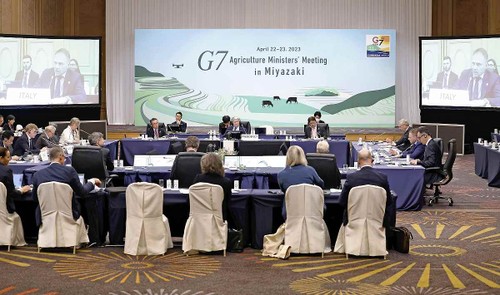 The G7 Agriculture Ministers' Meeting in Miyazaki issues a joint statement calling for an extension of the Black Sea Grain Initiative. (Photo: Yomiuri Shimbun) The G7 Agriculture Ministers' Meeting in Miyazaki issues a joint statement calling for an extension of the Black Sea Grain Initiative. (Photo: Yomiuri Shimbun) |
In July 2022 Russia and Ukraine reached a deal brokered by the UN and Turkey to create a safe corridor for exports to avoid a global food crisis. The deal known as Black Sea Grain Initiative was initially valid for 120 days and then extended for another 120 days in November 2022, and another 60 days on March 18, 2023.
Grain export difficulties
Russia and Ukraine are major global food suppliers and Russia is the world's leading fertilizer exporter. Before their conflict began, the two countries accounted for 28% of global wheat exports and 75% of sunflower oil exports.
Agricultural products of Ukraine and Russia had previously been exported mainly through Black Sea ports. When the Russia-Ukraine conflict broke out, Russia blockaded Ukraine’s Black Sea ports.
The Black Sea Grain Initiative allows Ukraine to export grain through designated seaports on the Black Sea, and makes it easier for Russia to export food and fertilizers. But grain exports from the two countries are still restricted. Ukraine has exported approximately 27 million tons of grain from three ports, which is more than half of its 40.6 million tons of total export volume.
Some ports, including the most important port of Mykolaiv, are still closed. Ukraine has had to switch to land transportation and has expanded its ports on the Danube. The land route from northern Ukraine through Belarus has been closed almost completely, forcing Ukraine to transport large quantities of grain through other Eastern European countries.
Russia has repeatedly said that its grain and fertilizer exports have been affected by the West’s sanctions, specifically, cutting off the Russian Agricultural Bank (Rosselkhozbank) from the international payment system SWIFT.
Head of the Russian Grain Union Arkady Zlochevsky said on Monday that the Black Sea Grain Initiative has neither benefited Russia nor helped boost its export of agricultural products to the global market. He warned that if the West’s sanctions on Russian agricultural and fertilizer exports are not removed, Russia will withdraw from the agreement on May 18.
Black Sea Grain Initiative must be fully complied with
Russian Foreign Minister Sergei Lavrov discussed the Black Sea Grain Initiative with UN Secretary-General Antonio Guterres in New York on Monday. In letters sent to Russian President Vladimir Putin and other parties, including Ukraine and Turkey, the UN chief proposed a way to solve the problem.
Recently, Russia said it would not negotiate to renew the grain deal if there is no progress in solving systemic problems related to payment connectivity, machinery supply, and insurance. The agreement that Russia signed has provisions specifying that the UN will create favorable conditions for the export of Russian food and fertilizers in three years. That’s the key point that makes the agreement constantly under threat of breaking.
The G7 Agriculture Ministers are calling for an extension of the Black Sea Grains Initiative and full compliance with and expansion of the agreement. This appeal comes as the World Bank, the International Monetary Fund, and the World Food Program warn of global food supply disruptions. Dozens of countries have recorded double-digit inflation, and 349 million people in 79 countries face severe food insecurity, including several African countries that are hotspots of hunger and poverty.